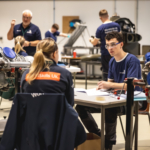‘Everyone should have the chance to fulfil the spark of potential which exists in all of us. You shouldn’t be destined to travel a certain path just because of the place that you start. That’s a simple concept – but not as easy to get right as many have found over the years’. (Damian Hinds, Education Secretary, speech to Resolution Foundation, 31 July.)
In his speech on social mobility this week, the Education Secretary, Damian Hinds, underlined the Government’s commitment in England to this most important of aims. As he said in his speech, there isn’t just a moral case for ensuring all people in society achieve their potential; there is an economic one too. Indeed, research from the Sutton Trust has taken this one step further by putting a price on the size of the prize if we get social mobility right. Even a modest increase in UK social mobility could be worth £39bn to the UK economy as a whole.
We shouldn’t be satisfied with average though – we should have the ambition to make the UK a world-class leader in social mobility. As the Education Secretary says, it sounds easy in theory, but the fact that we are currently below average shows how far we have to go. However, with an Education Secretary who says social mobility is his raison d’être for being in politics, with a social mobility plan in place and with the Social Mobility Commission taking forward a refreshed new agenda, we have every reason to be confident about what we can achieve as a country in the coming years.
And I’m clear about the role WorldSkills UK has to play in this: we are a social mobility accelerator. We don’t believe that where you start from in life should determine where you end up. But we do believe that talent can be found in every part of the country. However, it is not easy for all that talent to be realised, particularly for those young people from the most disadvantaged backgrounds. That is why we have set a demanding target to increase the percentage of young people involved in our skills competition programme to 25% within five years. The Education Secretary spoke of the need for ‘urgency’ in transforming social mobility; our target demonstrates our understanding of this urgency and our commitment to delivering on it.
When Team UK lands in Budapest to represent the UK and compete in EuroSkills in less than two months’ time, they will in many respects represent social mobility in action. Educated at their local state schools and FE colleges, taking their potential to the next level through ambition, hard work and determination and ready to take on the best from the rest of Europe in the full range of technical skills. Team UK is all that is good about the potential of studying and apprenticeships and what social mobility is all about in practice. A look back at the personal stories of Team UK members from previous years confirms this. Two such stories are those of Rianne Chester and Danny Hoang, both gold medal winners at recent Skills Olympics and European championships.
Rianne was educated at her local state schools and FE college, completing her training at Warrington Collegiate in North West England, a part of the country where social mobility lags. She won the gold medal and award for the highest overall score at the Sao Paulo Skills Olympics – the first UK competitor to do so. Rianne says that the experience ‘changed her life completely’. She now runs her own business which employs several people and has enjoyed significant growth in recent months.
Danny’s parents came to the UK from Vietnam and China in 1980 – neither could speak English. They opened up their own takeaway in Erith, South East London, which gave Danny his interest in cooking. After studying at Westminster Kingsway College, he decided to pursue a full-time career as a chef. Not only did he come away from the European championships in France with a gold medal, he was crowned Young National Chef of the Year shortly afterwards. He has since worked at a top restaurant in New York, and his ambition is to open his own restaurant near to where he grew up in Greenwich. Danny is living proof of his own mantra: ‘You don’t have to go to university to be smart’.
Stories like Rianne’s and Danny’s are not unusual in our work as our skills competitions programme puts a rocket booster under social mobility. Our work can help transform the lives of young people who otherwise might not have had the opportunity to fulfil their dreams of a successful career.
I was particularly pleased to see that the Education Secretary wants to focus on two aspects in particular to develop social mobility: character and resilience. Having spent a weekend with them at their training camp recently, I can confirm they are attributes which Team UK have in abundance. This is not surprising as they are attributes that are hard-wired into all levels of our skills competitions: our research with the Edge Foundation showed that consistently over 80% of all competitors believed that participating had developed their transferable skills, like resilience.
Getting into Team UK means that you have overcome seemingly insurmountable hurdles to put yourself on a stage to take on the rest of Europe, and ultimately, the world in the ‘skills olympics’. You’ve spent hundreds of hours in precision training in skills that are far from easy. You’ve pitted yourself against the best peers from England, Scotland, Wales and Northern Ireland and emerged on top. And you’ve seen the highs and lows of competition: the thrill of finishing first as well as the agony of falling short. In short, you have acquired the kind of character and resilience that will equip you not just to (hopefully) bring home a medal but to go on and achieve the career that your talent merits.
At WorldSkills UK we’re excited about the renewed focus on social mobility. We’re an organisation that exists to accelerate it. We look forward to continuing to work with all governments from across the UK to give more young people the opportunity to realise their potential through the power of skills competitions. In doing so, we really will make social mobility a reality for more and more young people.


